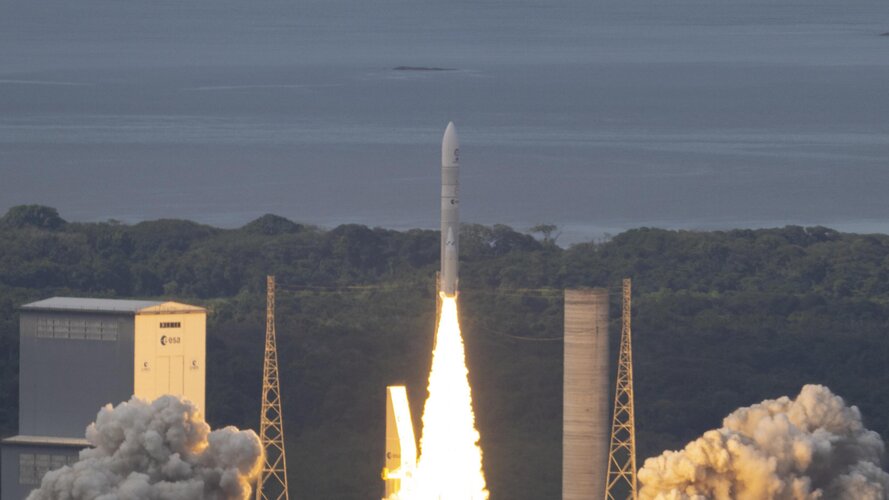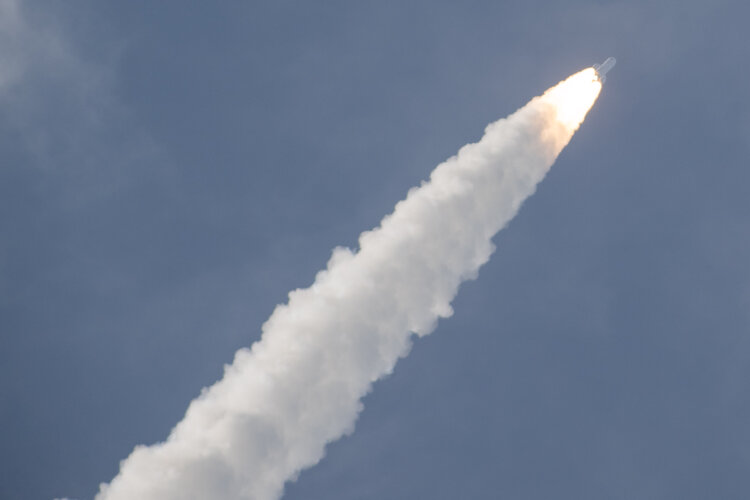Hubble finds evidence for rare black hole in Omega Centauri
Wednesday, 10 July 2024 14:00
An international team of astronomers has used more than 500 images from the NASA/ESA Hubble Space Telescope spanning two decades to detect seven fast-moving stars in the innermost region of Omega Centauri, the largest and brightest globular cluster in the sky. These stars provide compelling new evidence for the presence of an intermediate-mass black hole.
X-Bow raises $70 million to boost solid rocket motor production
Wednesday, 10 July 2024 13:22

The end of Chevron deference and what Loper Bright means for the space industry
Wednesday, 10 July 2024 12:00
Ariane 6 first flight highlights
Wednesday, 10 July 2024 08:00 Video:
00:02:06
Video:
00:02:06
Europe’s new rocket Ariane 6 powered into space on 9 July 2024 from a newly built dedicated launch pad in French Guiana. Liftoff occurred at 16:00 local time (20:00 BST, 21:00 CEST).
Europe’s new rocket Ariane 6 powered Europe into space taking with it a varied selection of experiments, satellites, payload deployers and reentry demonstrations that represent thousands across Europe, from students to industry and experienced space actors.
This inaugural flight, designated VA262, is a demonstration flight to show the capabilities and prowess of Ariane 6 in escaping Earth's gravity and operating in space. Nevertheless, it had several passengers
Europe's new Ariane 6 rocket blasts off for first time
Wednesday, 10 July 2024 06:00 Europe's new Ariane 6 rocket blasted off for the first time smoothly on Tuesday, carrying with it the continent's hopes of regaining independent access to space.
The much-delayed inaugural flight of the European Space Agency's most powerful rocket yet launched from Europe's spaceport in Kourou, French Guiana at 4pm local time (1900 GMT).
Crews on the ground at the launch site, which
Europe's new Ariane 6 rocket blasted off for the first time smoothly on Tuesday, carrying with it the continent's hopes of regaining independent access to space.
The much-delayed inaugural flight of the European Space Agency's most powerful rocket yet launched from Europe's spaceport in Kourou, French Guiana at 4pm local time (1900 GMT).
Crews on the ground at the launch site, which Ariane 6 inaugural flight press conference
Tuesday, 09 July 2024 22:00 Video:
00:32:50
Video:
00:32:50
Replay of the press conference held in Europe’s Spaceport in French Guiana with ESA, ArianeGroup, CNES and Arianespace representatives providing updates on the first mission of Ariane 6.
Access all the replays from the launch event.
Access all the launch campaign footage in broadcast quality.
Japanese venture seeks to develop commercial space station module
Tuesday, 09 July 2024 20:59

Ariane 6 first launch
Tuesday, 09 July 2024 20:50 Video:
03:33:02
Video:
03:33:02
Europe’s new rocket Ariane 6 powered Europe into space taking with it a varied selection of experiments, satellites, payload deployers and reentry demonstrations that represent thousands across Europe, from students to industry and experienced space actors.
This inaugural flight, designated VA262, is a demonstration flight to show the capabilities and prowess of Ariane 6 in escaping Earth's gravity and operating in space. Nevertheless, it had several passengers on board.
Ariane 6 was built by prime contractor and design authority ArianeGroup. In addition to the rocket, the liftoff demonstrated the functioning of the launch pad and operations on ground at
The first Ariane 6 rocket soars to the sky
Tuesday, 09 July 2024 20:25 Image:
The first Ariane 6 rocket soars to the sky
Image:
The first Ariane 6 rocket soars to the sky Europe's Ariane 6 rocket successfully launches for first time
Tuesday, 09 July 2024 18:35
Europe's new Ariane 6 rocket blasted off for the first time smoothly on Tuesday, carrying with it the continent's hopes of regaining independent access to space.
The much-delayed inaugural flight of the European Space Agency's most powerful rocket yet launched from Europe's spaceport in Kourou, French Guiana at 4pm local time (1900 GMT).
Crews on the ground at the launch site, which is surrounded by jungle on the South American coast, applauded as the rocket soared into clear skies.
Ariane 6's first launch, which was originally planned for 2020, is hoped to bring an end to a difficult time for European space efforts.
Since the last flight of its workhorse predecessor, Ariane 5, a year ago, Europe has been unable to launch satellites or other missions into space without relying on rivals such as Elon Musk's US firm SpaceX.
ESA chief Josef Aschbacher said it was a "very important moment for Europe".








